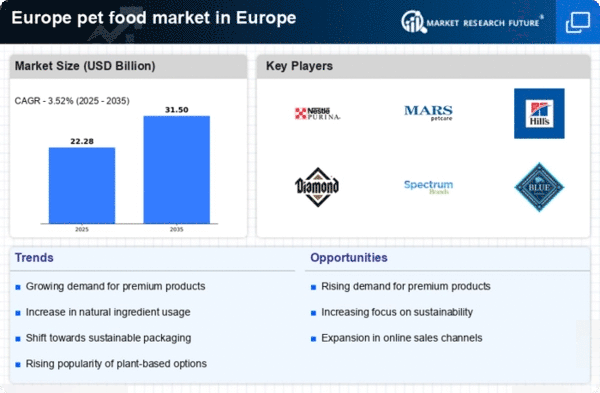The Europe Pet Food Market is characterized by a dynamic landscape influenced by changing consumer preferences, increasing pet ownership, and a growing trend towards premium and organic products. The competitive environment is robust, with a range of established brands and newer entrants vying for market share. Key players in this sector are focusing on innovative product formulations, enhanced nutritional profiles, and sustainable packaging solutions to meet the ever-evolving demands of pet owners. Additionally, the rise of e-commerce as a distribution channel has transformed how pet food is marketed and sold.
Brands are increasingly under pressure to not only cater to the nutritional needs of pets but also to align their operations with the broader ethical and environmental concerns of consumers. This competitive scenario highlights the importance of branding, innovation, and customer engagement as critical factors in achieving success in the European market.Royal Canin has established a significant presence within the Europe Pet Food Market, recognized for its commitment to specialized nutrition tailored to specific breeds and health conditions.
The brand leverages extensive research and development capabilities to create products that cater to the unique dietary needs of pets, thereby cementing its authority in the premium pet food sector. Royal Canin's strengths lie in its strong brand reputation, innovative approach to product formulation, and focus on scientific evidence, enabling the company to connect effectively with pet owners looking for high-quality nutrition for their animals.
Additionally, the company emphasizes education and support for pet owners through various initiatives, enhancing customer loyalty and building a community around its brand.Forthglade is another noteworthy player within the Europe Pet Food Market, known for its commitment to natural dog food products made using high-quality ingredients. The company places a special emphasis on grain-free options and minimally processed recipes, catering to a growing segment of health-conscious pet owners. Forthglade has positioned itself strongly within the premium segment by offering a range of wet and dry food products that prioritize the nutritional needs of dogs.
The brand is well-regarded for its transparency regarding ingredient sourcing, which resonates with consumers seeking wholesome options. Recent growth initiatives have included expanding their product range and enhancing market presence through strategic partnerships and distribution agreements. These factors, along with an increasing focus on sustainability in packaging and operational practices, contribute to Forthglade's strengths in the competitive landscape of the European pet food market.





















Leave a Comment